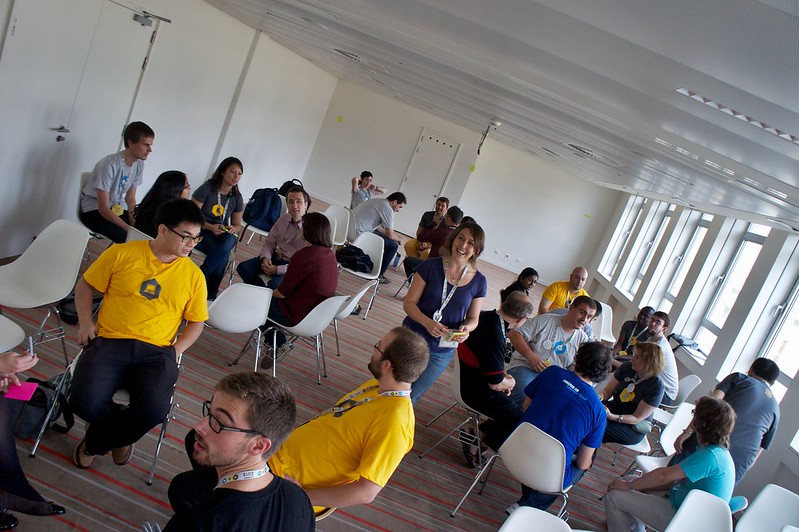Often it’s difficult to get contributions to open projects because some people aren’t quite sure what contribution means or how to go about doing it. Other folks don’t know what “Open” means, and thus they don’t know they can contribute at all. Perhaps it’s the nomenclature of “Open” that confuses people. Perhaps it’s just an “Open” marketing problem.
In any case, my suspicion has been that in order to activate people to teach the web, Mozilla would need to help people learn how to participate in an open community. Connecting to a specific community online requires a certain…persistence. There are also social skills at play that weren’t necessarily encouraged in our formal school systems.

It isn’t necessarily that I think people don’t know how to teach or even that they didn’t know how to teach digital skills, it’s just that in order to be intentional about teaching the skills and competencies that make up the Web Literacy Map, people need to understand concepts that underpin all of the work that we do. People also need to understand how to use web technologies in support of openness, and those two things together are, perhaps, more complicated than they sound.
I want to help people teach the web in an open and participatory way, which means that process would have to be opened up. I was thinking about what a kind of Technical Training program for the web would look like, and to me, it looked like an open community.
Our people – a globally diverse group of passionate educators and technologists – believe in the web as a platform for learning, sharing, connecting and making, and they believe that open practice and participation are key elements to becoming a citizen in the digital world. Our community members are eager to spread web literacy in their local contexts, but participating in the global movement means that one needs to navigate through a complex and sometimes confusing ecosystem of digital human communication.

Our Training program is designed to give people an easy in to the types of online communication and participation I’m talking about. We want to design a way for people to experiment and fail forward. We’d like the online component to support the offline actions and vice versa. This is the reason that everything in Webmaker Training is optional and that it’s all centered around making and connecting around what you make. This is also the reason that we are trying to encourage the peer to peer aspect of learning.
To help us do that, Mozilla is once again partnering up with P2PU, a group of incredible connected educators who are helping bake peer to peer interaction into the Webmaker Training content. Together, we’re working on a Training platform and program that will make it easy for anyone to jump in and see what the Webmaker community is making to support learning web competencies. We’re running ongoing feedback and testing sessions through this open Wiki and by talking about this program in the Teach the Web Community Calls.
To get involved, you can join our community calls or post your interest to any one of our monitored channels (#teachtheweb, #makerparty, @webmaker, the G+ Group, the Webmaker Newsgroup…). And if those options don’t appeal to you, you can send me an email and I’ll help you get started!
I see a lot of potential in the modular, remixable way we’re designing our trainings to be. We’re building the content hosting platform using GitHub Pages, which will make it easy for us to bake in YOUR feedback early and often. It also means that anyone can contribute to Webmaker Trainings by sending a pull request.
You can already build teaching kits for your specific organization or audience, and in the future, you’ll be able to build entire courses via remix. Using GitHub pages will allow us to build modules (e.g. courses) so that enthusiastic community members and partner organizations can remix them to run modified versions. Imagine if you could easily copy a single module, remix it to add your own lens, branding or curriculum and publish it. Then imagine that that action earned you a badge. Ideally, you will be able to save your new module to your Webmaker Profile, thereby giving you a URL where your module exists.
When this functionality is working, we’ll have an Open Educational Ecosystem (OEE, I just made up a new term!) that has learner-focused resources (starter makes), full scale lesson plans for in the classroom (Teaching Kits), and a courseware platform (Training Modules) for online learning. And the icing on the cake? It’s all remixable, it’s all truly open and it’s all built with the Webmaker Community.
We’d love to know what you think about this idea, so leave a comment or get in touch using the channels listed above!
